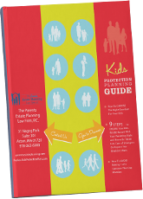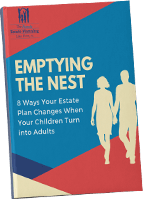
Right now, huge numbers of people are coming face-to-face with their own mortality, and realizing they need to plan for the worst, even as they hope for the best. This goes not just for those in the “senior” category, but for all of us, no matter our age. We are facing the reality of our mortality, and many of us are doing it courageously by learning and taking action on what we need to do for the people we love.
Recently I heard a tragic story from a colleague whose client recently lost her fiancé to COVID-19. Because she wasn’t listed on her fiancé’s health directive and HIPAA waiver, she could not get anyone to update her on his condition once he entered the hospital.
Naturally, she didn’t give up trying to get in touch, and eventually someone told her that he was no longer in the Intensive Care Unit (ICU.) She was enormously relieved, but when she didn’t hear any other news by the next day, she called again. Finally, after being transferred several times, she learned that the reason her fiancé wasn’t in the ICU was because he was in the morgue. He’d passed away the day before, and no one had told her. Heartbreaking.
Nobody expects something like this to happen, especially people who are healthy and making plans for their futures. But we are collectively reckoning with the fact that, sometimes, the worst does happen. If you get sick, you want the people you love to be able to be there for you as much as they are able, and if you pass away, to be able to grieve you, without a mess of confusion and unanswered questions, on top of it all.
Now is the time to think about your own situation. What will happen to your loved ones, and the assets you’ll leave behind, if you become sick or die?
Without a doubt, you would want to ensure certain people in your life are informed if you have to go to the hospital, and kept up-to-date on your condition while you are there. You’d also probably want to avoid them having to go through a drawn-out court process to handle your estate after your death, or save them from the fate of not being able to access your assets if you are hospitalized. We created a list providing you with ideas and information to make sure everything is in place so you can do the right thing for the people you love, just in case something happens to you.
The Things You Can Do Yourself
Have the Conversation
First of all, we all need to have a “worst-case scenario” conversation with our families. Talking about it won’t kill you, yet, many people try to avoid conversations about death. The truth is, we will all die. It’s better to face that with those that we love, and when the time comes, we will be as ready as we can be. Even if you have a legal representative designated, these conversations ensure they won’t have the burden of making decisions with uncertainty.
Create an Inventory of What Matters
This is something that you can get started on right now, by yourself, without the help of a lawyer. First, get out your calendar and schedule an appointment with yourself (and perhaps your spouse.) Set aside an hour to think about what you would want to happen if you were sick and couldn’t speak for yourself, or if you passed away. Who would you want your medical information shared with, and who could you trust to advocate for you? If you passed, who would raise your children in the way you want, and what assets would they have at their disposal to make the vision and dreams you have for your children a reality? What are the things you would want your family to know if you weren’t here to tell them? What would you say to them if you knew you were approaching your final moments?
The answers to these questions will provide you with a roadmap to establish an estate plan that protects you, your family, and your assets – during this COVID-19 crisis and beyond. If those questions give you anxiety, know that asking them, and then taking action, puts you in control and can offer great relief.
Create an Advance Health Care Directive
In Massachusetts, an Advanced Healthcare Directive, or Living Will, is not a legal document. Still, expressing your wishes -in writing- may be crucial in helping your health care representative make decisions on your behalf if you are incapacitated and unable to speak to your medical team yourself. There are many resources online for walking you through the creation of a Living Will. At our firm, we have guided steps through which we take our clients who wish to create a Living Will. Remember that, if you create a Living Will, you will also want to legally designate a Durable Power of Attorney so that they can carry out your wishes, and to authorize that person, through a HIPAA waiver, to obtain your medical information.
Record a Personal Interview
At a recent press event, Governor Baker reminded us all not to leave anything unsaid, especially when it comes to our loved ones. Having a conversation about your end-of-life wishes is a great first step, but what about all of your intangible assets– the stories, guidance, and advice that you would want your loved ones to know if you weren’t here to tell them? Taking the time to record your story and the guidance and wishes for loved ones and their future is a gift that those left behind will treasure more than any other asset you leave to them, and it’s something you can do yourself, right now. Your story is powerful and incredibly meaningful to the people who love you. We believe it is so meaningful that we include a Family Wealth Legacy Interview in each of our planning levels.
What A Lawyer Should Do For You
The goal in setting up your estate plan is, ultimately, to keep your loved ones out of the court process and out of conflict. To do that, you have to keep your estate plan up to date, and ensure you’ve made the right decisions in the estate planning process.
Under the following circumstances, you should not just do planning yourself, but instead have a Family Wealth Planning Session, during which we can look at your individual family dynamics, your assets, and the law so you can decide what you really do need for the people you love:
If you have assets, beyond what you can physically see and touch, and those assets are worth more than $100k;
If you have minor children;
If you live with your unmarried partner in a house that one of you owns and the other doesn’t (or even if you own it together);
If you are in a second (or more) marriage;
If you have complex family dynamics;
If you have a business you want to continue after you are gone;
If you know for sure you would want to keep your family out of court no matter what.
All of our Family Wealth Planning Sessions are happening virtually right now, and with the recent passage of a remote notarization bill in Massachusetts, your plan can be created without having any physical contact. It has always been our goal to make creating a plan to protect your family easy and today is no different. Give us a call to schedule your virtual Family Wealth Planning Session, if you are ready to face your mortality courageously.












